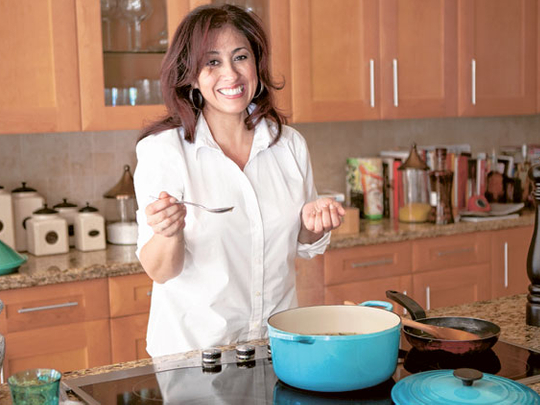
The woman working and chatting behind the kitchen counter often looked up and smiled brightly at me. I sat on the other side of the counter, subduing my hunger with watermelon juice. The busy counter held bowls of greens, browns and reds. Behind her on another counter sat trays with freshly baked tart shells and a couple of food boxes.
Transferring the last of the tomatoes she was chopping to the bowl, she looked up again, coincidentally at me, and asked "Who's hungry?" It must have been my empty stomach or all the lovely colours on the counter that made me say "Me!" and she burst out laughing along with the crowd around us.
Well-known Arab chef Suzanne Husseini was working at a mock kitchen in Bloomingdale's Home store in Dubai, preparing lunch for a few journalists before the recent launch of her book When Suzanne Cooks. The Arabic version of the book is scheduled for release soon. In February, she will be the master of ceremonies at the Gourmet Abu Dhabi and will teach a master class in Emirati cuisine.
Husseini, however, has a popular TV show, which has been running on an Arabic network for two years. "I'm in conversation with a couple of networks for shows in English and Arabic," Husseini said. For her, cooking on television is similar to a live demonstration and though she had trouble the first time she shot for television, she has never looked back. "Television cooking is a lot more hard work because you need to show the food at various stages and the final product in a limited time period. So you need to prepare for each step of the cooking. But I love it because it's like teaching, which is my other passion."
During a delicious lunch of chicken tart, zatar and rocket salad, and kanafe, Husseini explained how she came to love food and cooking for family and friends.
"My mother is responsible for instilling the love of food in me. I loved the food she cooked. I loved the love she put in while cooking the food. And I got hooked on to that early — I was 10 — because it always put me in a happy place and made me feel good about myself," she said. "And she was always there encouraging me so much that I've turned it into my life — I've written a cookbook, hosted a television show — it's my career."
Speaking of inspirations, with Dubai's enormous culture of eating out, how can one be encouraged to cook at home?
"Supermarkets have made it un-thinkable that you don't find ready-made food though it proves to be a godsend sometimes. I draw my inspiration from the produce department — you see colours, you see flavours, you see combinations. I'm also inspired by other cookbooks, maybe not to follow a recipe but just to get an idea. Most of all, what keeps me from picking up the phone and ordering pizza is that I know if I make it, or for that matter if you make it, with your own hands and with all that love, it's definitely going to taste better."
Often, Middle Eastern food is seen to be heavy, laden with meats and rice. Does she agree?
"That's a myth I hope I'll shatter with my book," she said. "Middle Eastern food is very healthy — it's not greasy. Well, some dishes are fried so there's no getting around it. Butter is not used in large quantity, maybe in one particular dish or regional cuisine. But it is too big and diverse and you cannot put it in a box and say it is all rice. It's the Mediterranean diet that doctors all over the Western world prescribe if you've had a heart attack or have any other health condition. It's all about olive oil, fresh fruits, vegetables and pulses."
Husseini advises aspiring chefs to cultivate their passion. "Look at it with love. Ask if this is something you want to do the moment you wake up in the morning. Being a chef is wonderful but it is also, often, a thankless profession because you are always backstage and don't necessarily get the recognition you deserve. But I believe life is too short to do anything that you don't like. And if being a chef is what you want, so be it. It's great for us because we'll have more great food to eat."
The key to home cooking
Keep everything ready in its place before you start cooking — your vegetables are washed and chopped, your meats are marinated, spices are all within easy reach of you. So you turn into a conductor that brings all these beautiful ingredients together.
Get hands-on
The best tool in the kitchen for Suzanne Husseini is her hands. "Think of the time when there were no food processors. The second-best is a good, sharp knife."
Five things your kitchen must have
"It's hard to imagine cooking without onion and garlic. And, of course, salt and pepper to enhance the flavouring. Lentils often come to my rescue. It can be made into a soup; it can become a jeddara, which is a lentils-and-rice dish or even a salad. Lentils are amazing — rich in protein and fibre," Husseini says.
Essence of Arabic cuisine
"Arabian cuisine is all about fresh ingredients. It is like an orchard. It is all about cooking and using ingredients to show off the ingredients. It's not too spicy. It has a lot of interesting techniques. We cook stuffed vegetables and meats, even carrots. Arabian cuisine has diverse ingredients only because the Arab culture sits on the crossroads of the spice trade. So while passing through, different cultures left a mark on the Arab cuisine, making it so much more interesting."








